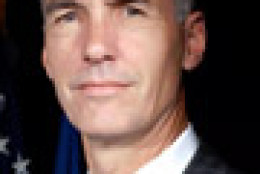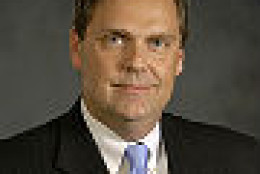Hubbard Radio Washington DC, LLC. All rights reserved. This website is not intended for users located within the European Economic Area.
Radio Interviews
-
If the recent Washington Metro tunnel fire showed anything, it's that emergency coordination down under is practically non-existent. Equally missing was interoperable radio communications — something the federal government has deemed essential for emergency response. Federal efforts to improve radio go back at least 20 years. Alan Tilles, chairman of the Telecommunications Department at the law firm Shulman, Rogers, Gandal, Pordy and Ecker, joined Tom Temin on the Federal Drive to discuss the communications failure.
January 28, 2015 -
Hiring in the federal government is supposed to be open, competitive and fair. But you get what you measure. The Merit System Protection Board recently released its annual Fair and Open Competition report. It's designed to ensure federal employees are hired based on their qualifications, not their connections. Allison Wiley is a senior research analyst at the board. She joined the Federal Drive with Tom Temin to discuss the report's findings. One of the key ones, she said, is that fair and open competition is still the standard in the majority of government hires.
January 28, 2015 -
Contrary to what you may have heard earlier in the week, Sgt. Bowe Bergdahl has not been charged with desertion. Bergdahl left his post in Afghanistan and was held prisoner by the Taliban for five years. He was returned to the United States in a prisoner exchange last May. Multiple media outlets reported desertion charges had been handed down or were impending. But the Army said no decision has been made. Brian Bouffard is a military defense attorney and former JAG. He joined Tom Temin on the Federal Drive to speculate on what happens next.
January 28, 2015 -
The Pentagon led the way for the rest of the government by implementing two-factor authentication across many of its systems. But plenty of important IT infrastructure still relies on a "reckless" system that depends on passwords alone for authentication.
January 28, 2015 -
The Federal Headlines is a daily compilation of the stories you hear discussed on Federal News Radio each day. It is designed to give FederalNewsRadio.com readers more information about the stories heard on the radio. In today's news, the man who flew a drone onto the White House lawn works for the National Geospatial Intelligence Agency, health care enrollment is getting closer to the Obama administration's goal and there's a little less gobbledygook coming from the federal government.
January 28, 2015 -
John Landwehr, Public Sector CTO at Adobe, explains how his company can assist federal agencies with their IT challenges. January 27, 2015
January 27, 2015 -
Carolyn Alston and Bill Gormley with the Coalition for Government Procurement, look back at what happened in government wide contracting in 2014, and what's ahead in the new year. January 27, 2015
January 27, 2015 -
The Veterans Affairs Department's computers and networks get a clean bill of health from third-party experts. The analysis comes about a year and a half after the VA came under intense scrutiny at a House Veterans Affairs Committee hearing for having major cybersecurity vulnerabilities. Federal News Radio Executive Editor Jason Miller tells In Depth with Francis Rose about the report and what it means for veterans' data.
January 27, 2015 -
Earlier this month, the Defense Information Systems Agency announced a major reorganization. It says the changes would help drive cybersecurity into everything the agency does. But DISA will never have unlimited resources, so it's now moving toward a "risk management" approach to cybersecurity: Accepting risk in some areas so that it can make sure that what really matters is highly secure. The risk management executive is a new position within the agency's organizational chart. DISA Risk Management Executive Mark Orndorff talked about the new cyber philosophy with Federal News Radio DoD Reporter Jared Serbu.
January 27, 2015 -
Federal agencies are experiencing a drought of IT professionals. The best way to get around it is to build an elite team of IT experts that can spearhead innovation at your agency. Richard Spires is CEO of Resilient, and former Chief Information Officer of the Homeland Security Department. On In Depth with Francis Rose, he shared ideas for how to build that elite cadre of IT professionals.
January 27, 2015 -
The Defense Department knows it wants to reduce the size of its headquarters, but it doesn't know exactly how. John Pendleton, director of defense capabilities and management issues at the Government Accountability Office, tells In Depth with Francis Rose how the Pentagon should plan to trim down its management offices.
January 27, 2015 -
A new outreach initiative at the Thrift Savings Plan comes from their Enterprise Risk Management Office. That Office is about two years old. The TSP wants the longest list possible of potential risks to their operation. Kim Weaver is director of external affairs at the TSP. On In Depth with Francis Rose, she said the ERM Office's new effort will look at risk in a number of different ways.
January 27, 2015 -
Federal agencies need three critical ingredients in place for data to make a lasting impact on their mission. That's according to Steve Beltz, senior consultant for Guidance Software, and former assistant director of the Recovery Operations Center for the RAT Board. On In Depth with Francis Rose, he promoted the "three-legged stool approach" to federal agency data.
January 27, 2015 -
Susie Adams, chief technology officer for Microsoft Federal, sat down with Women of Washington to discuss how the government can leverage cloud computing solutions.
January 27, 2015














